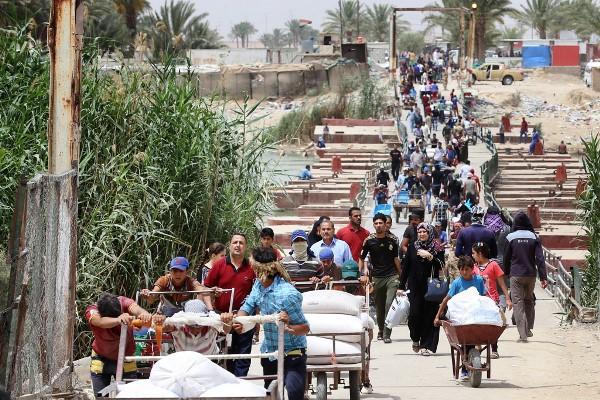Civilians trying to flee the siege of Fallujah have to run two gauntlets -- sniper fire from Islamic State in Iraq and Syria holdouts in the city and then security "screening" by Iraqi forces that can include beatings and alleged summary executions, according to human rights groups and the United Nations.
"There are extremely distressing, credible reports that some people who survive the terrifying experience of escaping from (Fallujah) then face severe physical abuse once they reach the other side," the UN's High Commissioner for Human Rights, Zeid Ra'ad Al Hussein, said in a statement.
The civilian families who "have faced enormous difficulties and dangers getting out of Fallujah alive, are now facing double jeopardy in the form of serious human rights violations after they have escaped," Zeid said.
Amnesty International reported that Fallujah residents who managed to escape have related harrowing stories of the dangers they faced -- from both sides.
"These include being caught by ISIS fighters and executed on the spot, treacherous routes out contaminated by mines and other explosive remnants of war, and the risk of arrests and other revenge attacks by the government-backed Popular Mobilization Units (PMU)" made up of Shia militias, Amnesty said.
The United States, which has backed the siege with airstrikes and artillery fire, has drawn the line against cooperating with the units and its Iranian advisers, but has pointed to statements by Iraqi Prime Minister Haider al-Abadi that they will be kept out of the final attack on Fallujah.
Abadi on May 22 announced the campaign to retake Fallujah following a wave of ISIS truck and car bomb suicide attacks militants in Baghdad that killed hundreds and led to Shia protests that breached the walls of the "Green Zone," the seat of the Baghdad government and the site of the U.S. Embassy.
About 50,000 people were believed to remain in Fallujah, once a city of about 300,000, and the "Iraqi government has been clear that protecting these civilians is their priority," according to Army Col. Steve Warren, who was the main spokesman for Combined Joint Task Force-Operation Inherent Resolve before returning to the states last week.
"It's tough to get out" of Fallujah, Warren said. The fighters of the Islamic State of Iraq and Syria "want to hide behind the civilian population," he said. "It's going to be a hard challenge to find a way to liberate this city and still keep the civilian population as safe as possible."
The concerns about a possible bloodbath if the Shia militias enter mostly-Sunni Fallujah have also been voiced by the most revered Shia cleric in Iraq, the Grand Ayatollah Ali Sistani.
In statements attributed to Sistani from the Iraqi holy city of Najaf, he urged the Shia militias and the Iraqi Security Forces to adhere to "the standard behaviors of jihad" and avoid harming civilians: "Don't be extreme, don't be treacherous. Saving innocent people from harm's way is the most important thing."
The push to retake Fallujah appeared to have bogged down in recent days in the plus-100 degree heat in the area coupled with the onset of Ramadan, the Muslim holy month of fasting.
However, Pentagon Press Secretary Peter Cook said Monday that there was "daily coordination" between the Iraqi Security Forces and Army Lt. Gen. Sean MacFarland, commander of Combined Joint Task Force - Operation Inherent Resolve, on the progress of the campaign.
"We continue to provide support, air strikes being the most obvious example of support for the fight in Fallujah," Cook said at a Pentagon briefing. "And Gen. MacFarland remains our point person with regard to that contact with the Iraqis, continues to provide his advice and counsel along the way."
Amid the accounts of abuses, there have also been reports from fleeing Fallujah civilians on how surprised they were at being treated well upon reaching Iraqi lines.
"We were surprised that they treated us so well," said a man at a camp who was in his 50s and gave his name as Abu Muhammad. He said the ISIS fighters "had told us the Shiites wanted revenge and would kill us," The New York Times reported.
His account contrasted with the statement from the UN's Zeid, the human rights official.
"Eyewitnesses have described how armed groups operating in support of the Iraqi Security Forces are intercepting people fleeing the conflict, separating the men and teenage boys from the women and children, and detaining the males for 'security screening', which in some cases degenerates into physical violations and other forms of abuse, apparently in order to elicit forced confessions," he said. "There are even allegations that some individuals have been summarily executed by these armed groups."
While the ISF has a "legitimate interest" in vetting the fleeing civilians, Zeid said that "Where individuals are being held by other armed groups not legally authorized to detain individuals, the government must ensure they are either handed over or released safely.
"It is paramount that all individuals fleeing the violence around Fallujah must be assumed to be civilians without links to armed groups, unless there is clear and cogent evidence to the contrary," he said.
--Richard Sisk can be reached at Richard.Sisk@Military.com.





























